Grievance Letter Template To An Employer For Employee
[Your Name]
[Your Address]
[City, State, ZIP Code]
[Email Address]
[Phone Number]
[Date]
[Employer's Name]
[Company Name]
[Company Address]
[City, State, ZIP Code]
Subject: Formal Grievance Letter
Dear [Employer's Name],
I am writing this letter to formally raise a grievance regarding [specific issue or incident] that has occurred within the workplace. As an employee of [Company Name], I believe it is essential to address this matter through the appropriate channels to ensure a fair and respectful resolution.
Description of the Incident or Issue:
[Provide a detailed description of the incident or issue that led to your grievance. Include dates, times, locations, names of individuals involved, and any relevant witnesses.]
Impact on Me:
[Explain how the incident or issue has personally affected you, both emotionally and professionally. Detail any stress, discomfort, or negative impact on your job performance or well-being.]
Relevant Policies and Procedures:
[Reference any company policies, codes of conduct, or relevant employment laws that you believe have been violated in this situation.]
Previous Communication:
[If applicable, mention any prior attempts you've made to address the issue informally or through other means, such as discussing it with a supervisor or HR representative.]
Desired Resolution:
[Clearly state what outcome you are seeking from this grievance process. This could include actions such as an investigation, corrective measures, training, or other steps to prevent future occurrences.]
Request for Meeting:
I kindly request a meeting with you or an appropriate representative of the company to discuss this matter further. I believe that an open and constructive dialogue will contribute to a swift resolution and help maintain a positive work environment.
Please let me know a suitable time for you to meet, or if you would prefer to communicate through a different medium, such as email or phone.
I appreciate your prompt attention to this matter and look forward to resolving it amicably. Thank you for your understanding.
Sincerely,
[Your Signature] (if sending a hard copy)
[Your Typed Name]
[Enclosures: List any documents or evidence you may be including with the letter, such as copies of emails, incident reports, etc.]
[CC: Human Resources, if applicable]
Formal Grievance Letter to Employer
Subject: Formal Grievance Regarding Workplace Concerns
Dear [Manager’s Name],
I am writing this letter to formally raise a grievance regarding a matter that has affected my working conditions. Despite my efforts to resolve this issue informally, I believe it is necessary to bring it to your attention through the formal grievance process.
The issue relates to [explain the problem clearly, e.g., workplace harassment, discrimination, unsafe conditions, unfair workload]. This situation has caused [state the impact, such as stress, reduced productivity, or negative work environment].
I kindly request a thorough investigation into this matter and would appreciate being informed of the steps that will be taken to address my concerns. I am available to meet and discuss this issue further at your earliest convenience.
Thank you for taking my grievance seriously. I trust that the company values fairness and will take appropriate action to resolve this situation.
Yours sincerely,
[Employee Name]
Casual Grievance Email to Employer
Subject: Concern I’d Like to Raise
Hi [Manager’s Name],
I wanted to take a moment to share something that has been bothering me at work. It’s about [briefly explain issue, e.g., constant overtime without notice, conflict with a colleague, or lack of resources].
I don’t want this to escalate, but I feel it’s important to let you know how it’s affecting my ability to do my job. I’d really appreciate the chance to sit down and discuss possible solutions.
Thanks for your understanding and support.
Best regards,
[Employee Name]
Serious Grievance Letter about Harassment
Subject: Grievance Regarding Harassment at Workplace
Dear [HR Manager/Employer],
I am writing to formally lodge a grievance concerning harassment I have experienced in the workplace. The incidents involve [explain the harassment in detail, including dates, times, and individuals involved if possible].
This behavior has created a hostile work environment for me, and I no longer feel comfortable carrying out my duties in such circumstances. I request that an immediate investigation is conducted and that appropriate measures are taken to ensure my safety and well-being.
I am willing to cooperate fully in any inquiry and can provide additional details or witnesses if required. Please confirm receipt of this grievance and inform me of the next steps in the process.
Thank you for your prompt attention to this serious matter.
Yours sincerely,
[Employee Name]
Provisional Grievance Message
Subject: Raising a Concern for Review
Dear [Manager’s Name],
I would like to provisionally raise a grievance regarding [issue]. While I am open to resolving this matter informally if possible, I feel it is necessary to document my concern in writing to ensure it is taken seriously.
The issue has been ongoing since [timeframe] and has affected [impact on workload, well-being, or work environment].
I hope that with your guidance, we can address this matter quickly and fairly. If needed, I am willing to escalate it formally through HR.
Thank you for your time and support.
Best regards,
[Employee Name]
Heartfelt Grievance Letter Regarding Workload
Subject: Grievance About Excessive Workload
Dear [Manager’s Name],
I truly value my role in the company and the opportunities I have been given. However, I am struggling with the excessive workload that I have been assigned recently. Despite my best efforts, I find it increasingly difficult to maintain a balance between quality work and meeting deadlines.
This situation has begun to take a toll on my health and well-being. I kindly request that my workload be reassessed or redistributed to ensure sustainability and fairness.
I am committed to the success of the team and hope this issue can be resolved in a way that benefits both the company and myself.
Thank you for your understanding.
Sincerely,
[Employee Name]
Quick Grievance Email
Subject: Concern That Needs Attention
Dear [Manager’s Name],
I am writing to raise a grievance regarding [specific issue]. This situation has impacted my work and needs to be addressed.
I would appreciate a meeting to discuss this matter further.
Thank you,
[Employee Name]
Official Grievance Letter to HR
Subject: Official Grievance Submission
Dear HR Department,
I am submitting this letter as a formal grievance regarding [describe issue]. Despite attempts to resolve this matter informally, no resolution has been reached.
The grievance relates to [details of issue], and it has impacted my work environment in the following ways: [list impacts]. I am requesting that HR conduct an investigation and implement corrective measures.
I have attached supporting documents and records for your review. Please confirm receipt of this grievance and let me know the next steps in the process.
Thank you for your attention.
Yours sincerely,
[Employee Name]
What is a grievance letter to an employer and why do you need it?
A grievance letter is a written complaint by an employee to their employer or HR department about a workplace issue.
It is needed because:
- It formally documents the problem.
- Ensures the concern is taken seriously.
- Triggers an official process for resolution.
- Protects the employee’s rights and provides evidence if legal steps are needed.
Who should send a grievance letter?
- Any employee who feels wronged, harassed, discriminated against, or unfairly treated.
- Staff facing unsafe working conditions or unreasonable workloads.
- Employees who have tried informal methods but need formal escalation.
To whom should the grievance letter be addressed?
- Direct supervisor or manager, if the issue is minor and resolvable at that level.
- HR department, if the issue involves serious complaints like harassment or discrimination.
- Senior management, if the grievance is against the immediate manager.
When should you send a grievance letter?
- After attempts to resolve the issue informally have failed.
- Immediately in cases of harassment, discrimination, or unsafe conditions.
- When the issue begins to affect your work performance or mental health.
How do you write and send a grievance letter?
- Clearly state the issue.
- Provide specific details (dates, times, people involved).
- Explain how it has affected you.
- Request investigation or action.
- Maintain a respectful and professional tone.
- Send via official company channels (HR email, registered letter, or employee portal).
Common mistakes to avoid in a grievance letter
- Writing emotionally without facts.
- Failing to include evidence or specific examples.
- Using aggressive or accusatory language.
- Skipping proper channels and sending to the wrong person.
- Submitting too late after the incident.
Elements and structure of a grievance letter
- Subject line: Clear and precise.
- Opening greeting: Address the right person.
- Introduction: State purpose of writing.
- Details: Describe issue, timeline, and impact.
- Request: Ask for investigation or resolution.
- Closing: Sign off respectfully.
- Attachments: Add supporting evidence if available.
Tips for writing an effective grievance letter
- Be concise but detailed.
- Stick to facts, avoid exaggeration.
- Keep tone professional, not emotional.
- Use dates and evidence to strengthen your case.
- Ask for acknowledgment of receipt.
What to do after sending a grievance letter?
- Wait for acknowledgment of receipt.
- Cooperate with HR or investigation procedures.
- Keep copies of all communication.
- If no action is taken, consider escalating to higher management or external authorities.

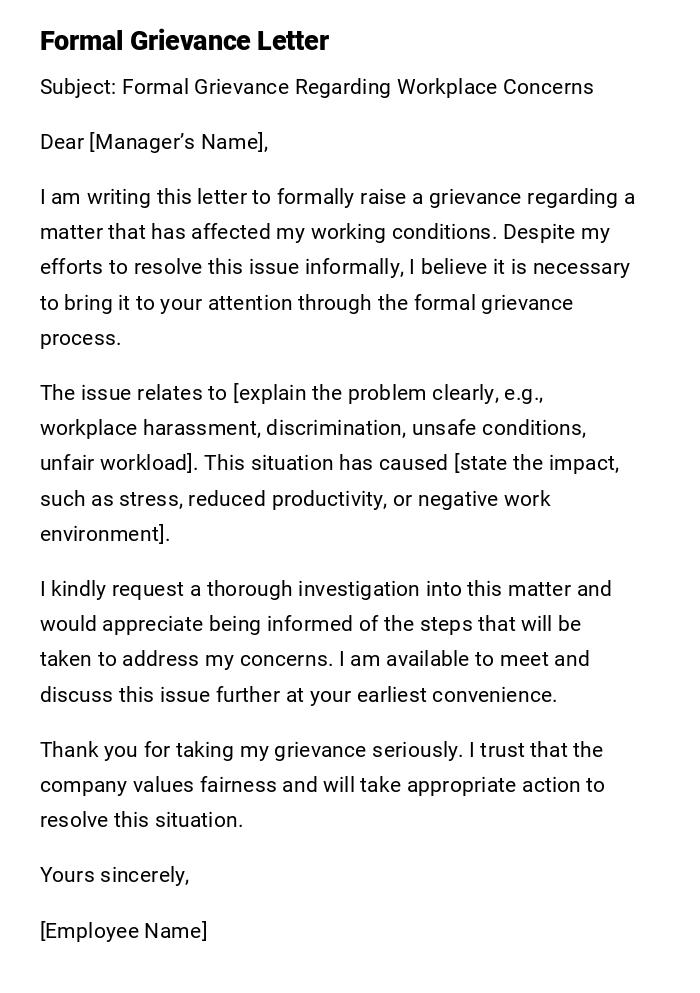
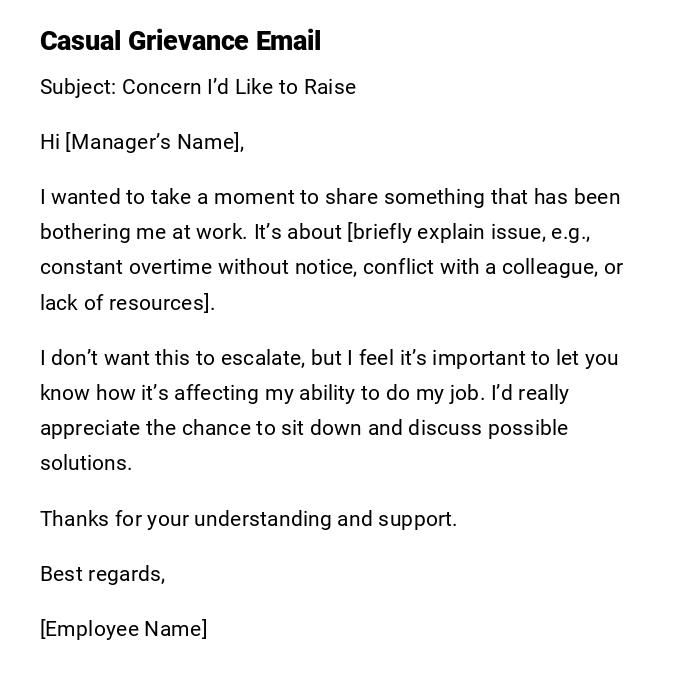
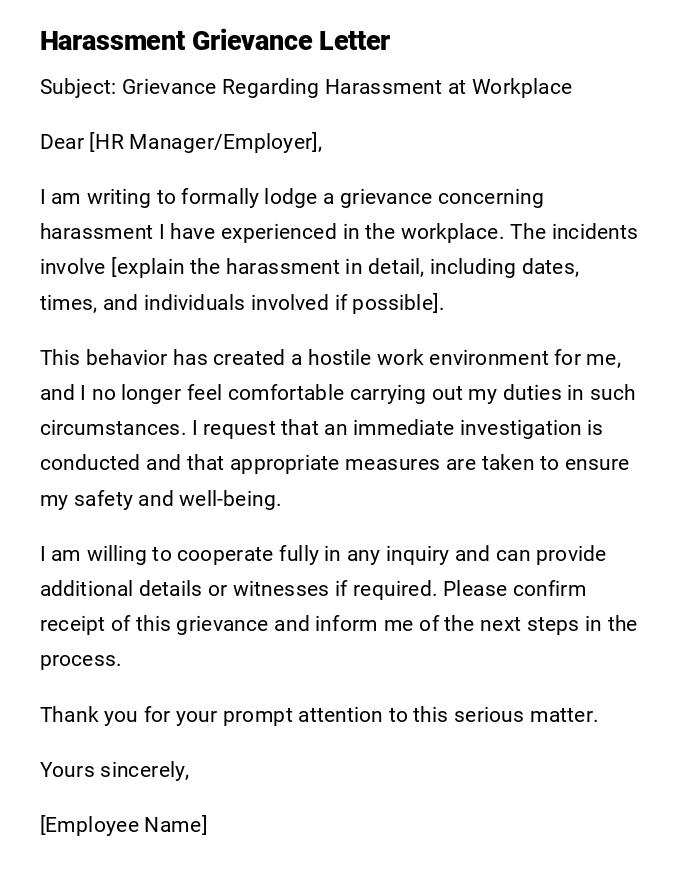
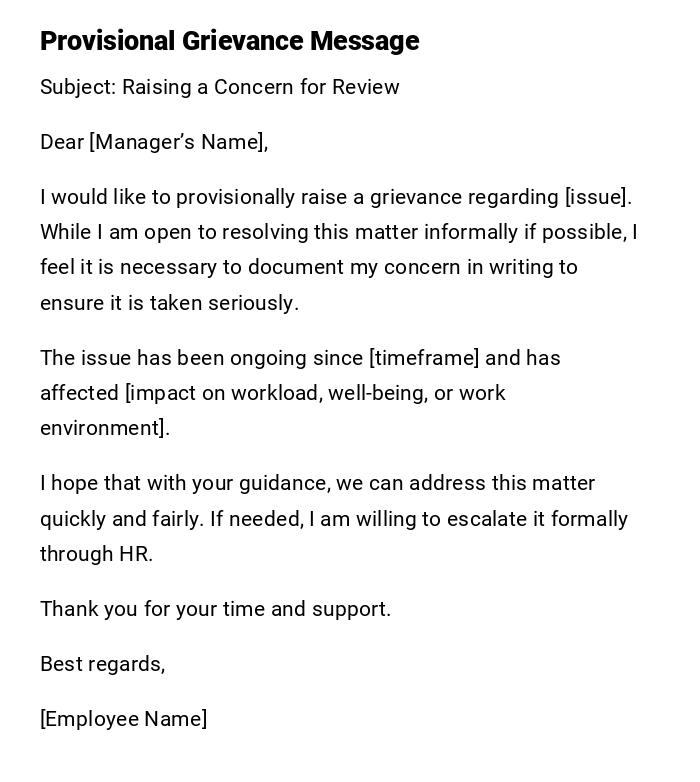
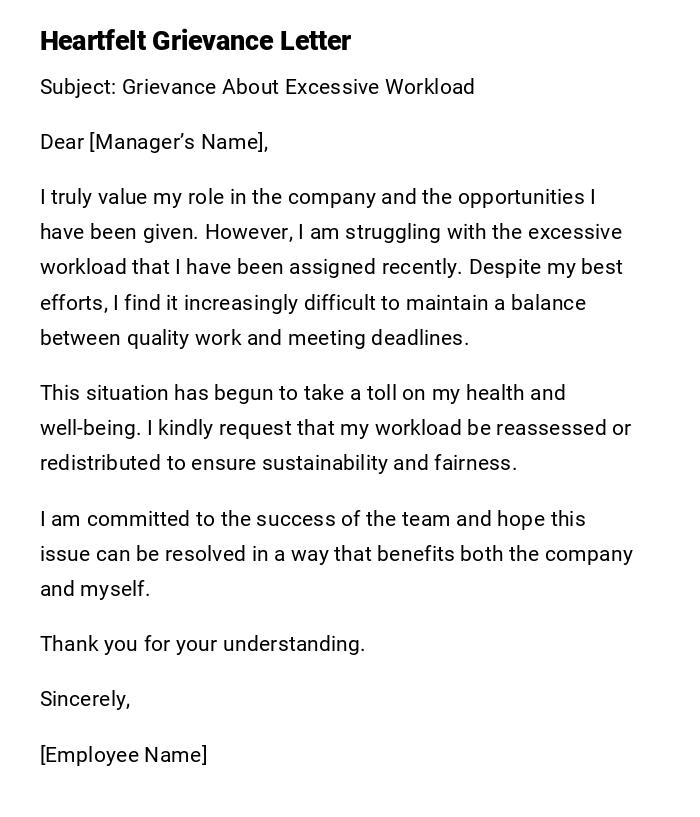
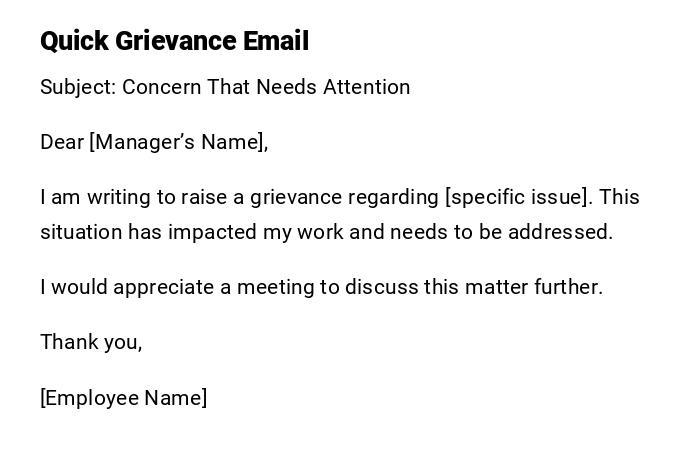
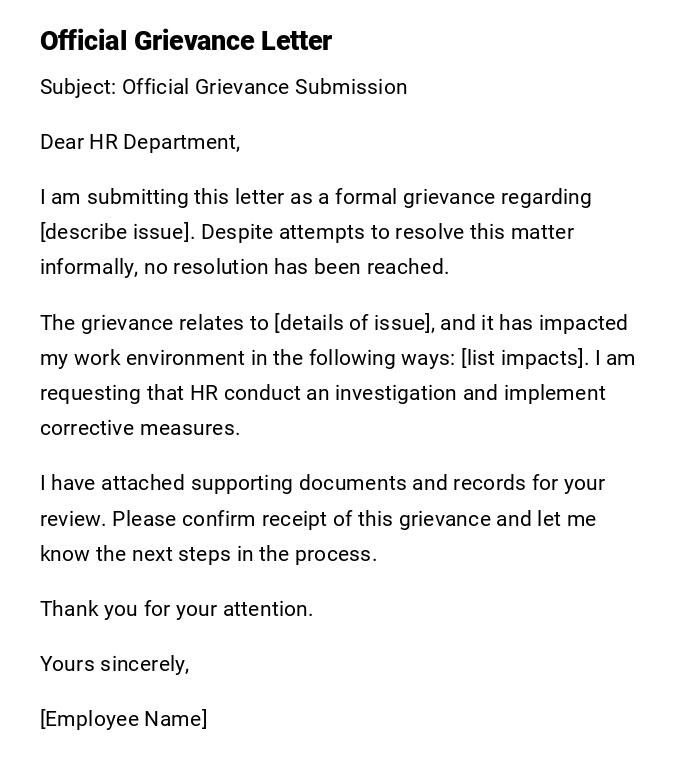

 Download Word Doc
Download Word Doc
 Download PDF
Download PDF